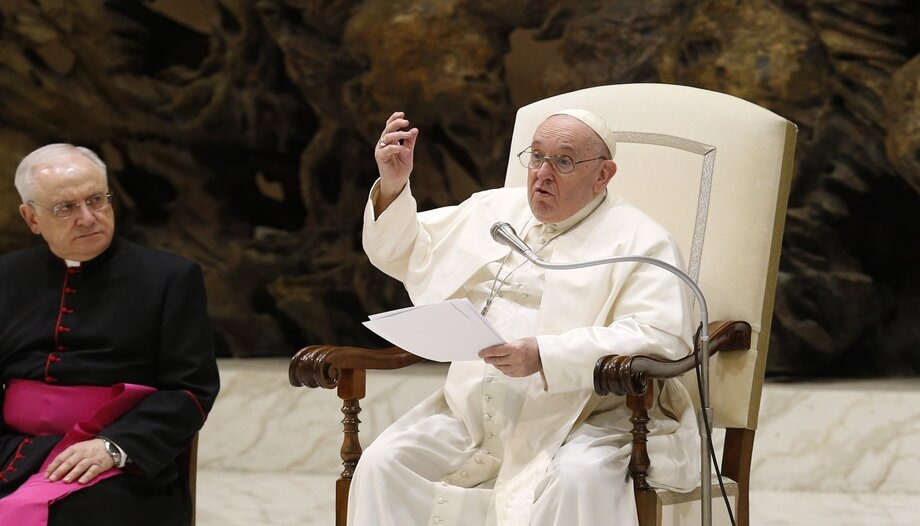Pope Francis has taken up the catechesis on apostolic zeal. This time he focused his preaching on the figure of Jesus and his pastoral heart, "the unsurpassable model of proclamation. Christ, who is the Word of God, "is always in relationship, always going out". Being the Word, he is the Word, who "exists in order to be transmitted, communicated". In short, Jesus is the "eternal Word of the Father who comes to us. Christ not only has words of life, but makes of his life a "word of life". WordHe lives always directed towards the Father and towards us".
The beginning
The Pope invites us to fix our gaze on Jesus' journeys, in which "we see that in the first place is intimacy with the Father, intimacy with the Father, intimacy with the Father, intimacy with the Father, intimacy with the Father, intimacy with the Father, intimacy with the Father. prayerJesus gets up early, while it is still dark, and goes to deserted areas to pray. It is there, "in this relationship, in the prayer that unites him to the Father in the Spirit, that Jesus discovers the meaning of his being man, of his existence in the world as a mission for us".
To go deeper into this, Francis analyzes the first public appearance of Christ: "Jesus does not make a great prodigy, he does not launch a message with effect, but mingles with the people who were going to be baptized by John. Thus he offers us the key to his action in the world: to wear himself out for sinners, becoming in solidarity with us without distance, in the total sharing of life".
In this way, says the Holy Father, we can see that "every day, after prayer, Jesus dedicates his entire day to proclaiming the Kingdom of God and to people, especially the poorest and weakest, sinners and the sick".
The pastoral heart of Jesus
It is easy to identify Jesus with a concrete image. The Pope points out, "Jesus himself offers it to us, speaking of himself as the Good Shepherd, the one who - he says - "gives his life for the sheep". In fact, being the shepherd was not just a job, which required time and much commitment; it was a true way of life: twenty-four hours a day, living with the flock, accompanying it to pasture, sleeping among the sheep, caring for the weakest. In other words, Jesus does not do something for us, but gives his life for us. His is a pastoral heart.
The pastoral care of the Church
Francis points out the comparison between the mission of Jesus and the action of the Church, which is often described as "pastoral". In evaluating this activity, "we must compare ourselves with the model, Jesus the Good Shepherd. First of all, we can ask ourselves: do we imitate him by drinking from the wellsprings of prayer, so that our heart is in tune with his?"
The Pope invites us to keep in mind chapter 15 of the Gospel of Lukewhere the parable of the lost sheep is found. In this we can see the pastoral heart that "suffers and risks. He suffers: yes, God suffers for the one who leaves and, while we mourn him, he loves him even more. The Lord suffers when we distance ourselves from his heart. He suffers for those who do not know the beauty of his love and the warmth of his embrace. But, in response to this suffering, he does not close himself off, but risks: he leaves the ninety-nine sheep that are safe and ventures out for the one lost one, doing something risky and also irrational, but in keeping with his pastoral heart, which is nostalgic for those who have gone; not anger or resentment, but an irreducible longing for us. It is the zeal of God".
With this, Pope Francis concludes by saying: "Do we have similar feelings? Perhaps we see as adversaries or enemies those who have left the flock. Meeting them at school, at work, on the streets of the city, why not rather think that we have a beautiful occasion to witness to them the joy of a Father who loves them and has never forgotten them? There is a good word for them and we have the honor and the burden of carrying it. Because the Word, Jesus, asks this of us. Perhaps we have been following and loving Jesus for a long time and we have never asked ourselves if we share the sentiments, if we suffer and risk in tune with his pastoral heart! It is not a matter of proselytizing so that others may be "of our own", but of loving so that they may be happy children of God".







